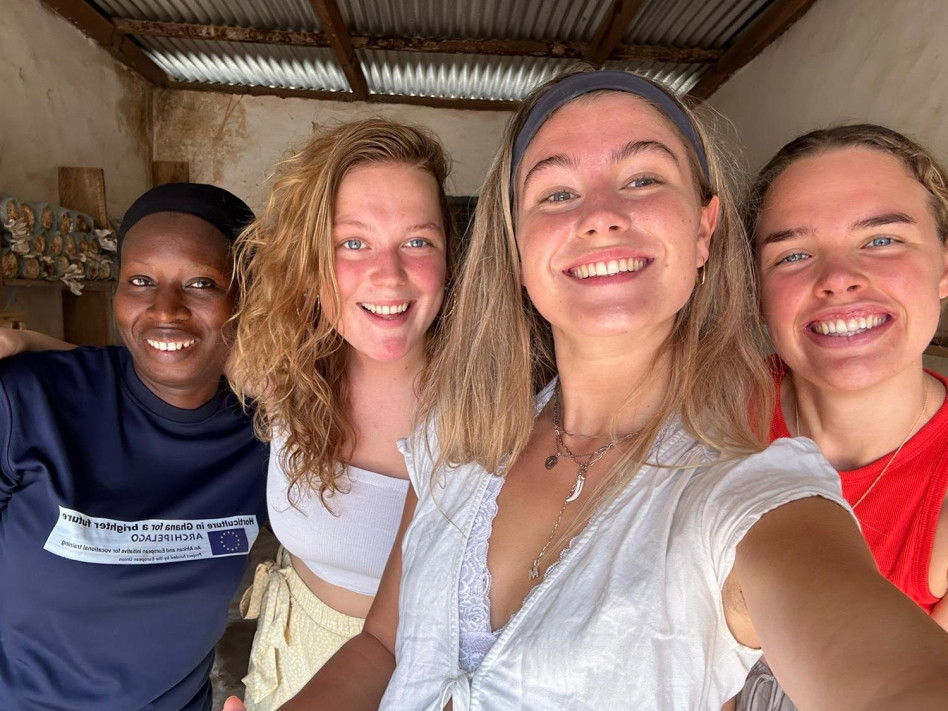For three months we (Sanne, Robyn, and Maud) will be in Ghana for our minor International Entrepreneurship and Development. We are working together with the start-up JDEVS Limited Company. After completing the archipelago project Vivian, Desmond, Jacqueline, and Elias all participated in the Archipelago project at the Kwadaso Agricultural College. This educational experience was led by experts from Kwadaso Argic College, Delft University of Technology, and Holland Greentech
JDEVS Mushroom Tea is an innovative project aiming to minimize food waste in Ghana. Oyster Mushrooms thrive in Ghana, using less water and land to grow on than other products. However, after harvesting, the mushrooms should be consumed within just 1 or 2 days. JDEVS found an innovative solution for long-term storage and consumption of the mushrooms, namely making tea out of it. This idea is not only good for the environment, but also empowers the entrepreneurial mindset by generating their own income and hopefully creating more employment in the future.
However, one of the primary challenges JDEVS faces is related to the thickness of their tea bags. Right now, the tea bags are quite thick which necessitates a larger quantity of tea for a satisfactory taste. Consequently, there is a need to investigate and develop thinner and environmentally friendly tea bags. Moreover, it is important that tea bags can be produced locally, reducing the reliance on imported tea bags from distant sources like China. Furthermore, JDEVS currently lacks an online presence. This presents an opportunity to establish their digital footprint if time allows. Moreover, the current dehydrator used for the mushrooms is relatively small and consumes a significant amount of energy. Again, if we find we have enough time to tackle this problem we would like to explore potential solutions to optimize the dehydrator’s efficiency and energy usage. Lastly, as we dive deeper into the Mushroom Tea Project, we’ll explore JDEVS strategies and expected outcomes. Our central mission revolves around crafting sustainable and efficient tea bags as our primary goal within this project.
Update:
During the past weeks, we decided to break our mission down. We're focussing on not just one, but two awesome subprojects. First up, we investigated the world of sustainable tea bags here in Ghana. We've been conducting a series of interviews with people in Kumasi, learning how they prepare their tea and what they like… We’ve also sent out an online questionnaire to gather even more information on the possibility of bringing eco-friendly and sustainable tea bags to the market in Ghana. So far, it looks like the sustainable ‘metal tea egg’ is winning the race.
Secondly, we started with the design of an indirect solar dryer for the oyster mushrooms. As inspiration, we visited Joy - a chili pepper enthusiast who's rocking a solar-powered dryer-. We've teamed up with a talented TU Delft Master Group here in Ghana who are giving Joy's innovative dryer a boost. They shared all their findings and struggles, as we did with them. Tomorrow we will collect all the required materials together with Daniel, the carpenter at KAC. Coming weeks we will build the dryer and we can hopefully produce the first batch of sun-dried mushroom tea!
Update:
Unfortunately, our time in Ghana together with JDEVS came to an end. For the past six months, we have been able to develop ourselves during our minor International Entrepreneurship & Development. The goal was to work with JDEVS on growing their business. In the end, we completed two amazing projects towards a more sustainable company. So that goal is well accomplished!
At first, we performed market research with Desmond, consisting of three parts. What are actually the habits around drinking tea in Ghana? Are people willing to use and buy a reusable tea bag? As a result of the questionnaires and interviews, we and JDEVS made concrete ideas and plans for the future. Think about free sample packs with the reusable tea filter alongside their mushroom tea.
The second part of the project consisted of building the indirect solar dryer. All this we did together with JDEVS, several local stakeholders, and a group of students from the TU Delft. With full pride, we can say that Daniel built the dryer excellently using locally available and relatively cheap materials. The knowledge exchange will hopefully ensure more dryers at Kwadaso Agricultural College in the future.




